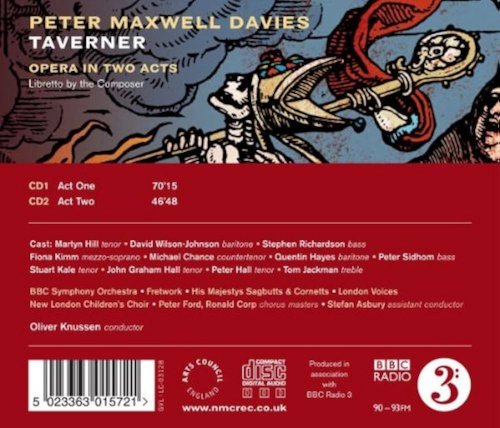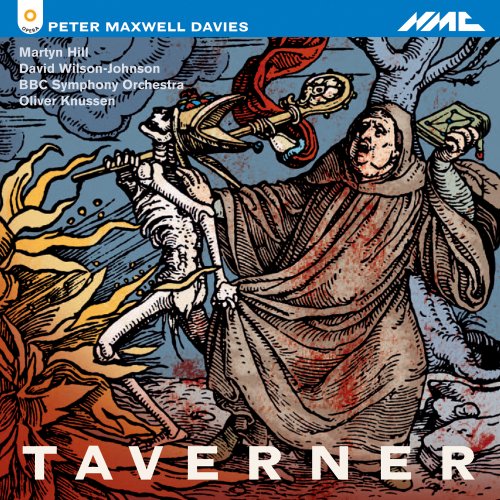
Martyn Hill, David Wilson-Johnson, BBC Symphony Orchestra and Oliver Knussen - Peter Maxell Davies: Taverner (2009)
BAND/ARTIST: Martyn Hill, David Wilson-Johnson, BBC Symphony Orchestra, Oliver Knussen
- Title: Peter Maxell Davies: Taverner
- Year Of Release: 2009
- Label: NMC Recordings
- Genre: Classical
- Quality: FLAC (tracks)
- Total Time: 01:56:59
- Total Size: 516 MB
- WebSite: Album Preview
Tracklist:
CD 1 - 01:10:13
Act I -
01. Call John Taverner - [19:18]
02. Transition (1) - [01:31]
03. Hoc opus est - [06:02]
04. Transition (2) - [03:17]
05. Our Good Lord Cardinal - [15:10]
06. John Taverner, What Does the Lord Require of Thee? - [06:58]
07. But This Is Not Enough, John - [06:58]
08. Behold His Body, in Every Place - [05:48]
09. Taverner, Sign Your Confession - [05:11]
CD 2 - 00:46:46
Act II -
01. My Lord Abbot - [06:36]
02. Transition (3) - [03:04]
03. How Fares Our Good Lord Cardinal? - [09:55]
04. Transition (4) - [01:01]
05. Videbat ergo Dominus in civitate iniquitatem - [08:01]
06. Transition (5) - [01:19]
07. This Is the Work of John Taverner - [16:50]

CD 1 - 01:10:13
Act I -
01. Call John Taverner - [19:18]
02. Transition (1) - [01:31]
03. Hoc opus est - [06:02]
04. Transition (2) - [03:17]
05. Our Good Lord Cardinal - [15:10]
06. John Taverner, What Does the Lord Require of Thee? - [06:58]
07. But This Is Not Enough, John - [06:58]
08. Behold His Body, in Every Place - [05:48]
09. Taverner, Sign Your Confession - [05:11]
CD 2 - 00:46:46
Act II -
01. My Lord Abbot - [06:36]
02. Transition (3) - [03:04]
03. How Fares Our Good Lord Cardinal? - [09:55]
04. Transition (4) - [01:01]
05. Videbat ergo Dominus in civitate iniquitatem - [08:01]
06. Transition (5) - [01:19]
07. This Is the Work of John Taverner - [16:50]
Peter Maxwell Davies' Taverner, based on the life of the 16th century English composer, stands in the tradition of operas like Pfitzner's Palestrina and Hindemith's Mathis der Maler that grapple with the topic of the artist's role in society, and it's good to finally have it recorded. The libretto, by the composer, mixes a fairly straightforward narrative of a pivotal episode in Taverner's life with elaborately grotesque metaphorical actions, to surreal and often perplexing effect. The story and the music are luridly, exaggeratedly expressionistic, but Davies seems utterly detached in his viewpoint. Taverner's conversion to Lutheranism is the main issue of the opera, but Davies' point of view about it, musically and narratively, is opaque. Was it a good thing? A bad thing? The audience is left guessing. The opera gathers momentum as it progresses. After a 70-minute first act that is largely rough going, much of it made up of jagged musical disjunctions taken at a slow or moderate tempo, Davies seems to hit his stride in the second act. The music is considerably more focused and coherent, concisely and aptly reflecting what is going on on-stage, and it builds to overwhelming power in the final scenes. Davies' vocal lines mostly sound random and chaotic, and don't give the singers much of an opportunity to produce beautiful sounds. The role of the Jester/Death is sharply characterized, though, and baritone David Wilson-Johnson makes it vividly sinister. The primary interest lies in the orchestral writing. Davies incorporates a Renaissance consort and uses it by itself, and in combination with the orchestra, with considerable inventiveness. Oliver Knussen leads a huge assembly of performers -- the BBC Symphony Orchestra, the early music ensembles Fretwork and His Majestys Sagbutts & Cornetts, and the London Voices and the New London Children's Choir -- in a committed and visceral performance of the complex score. The overall musical spikiness, lack of narrative clarity, and the gruesome details of the plot make this an opera that's not likely to inspire immediate affection, but it's an important, if flawed, work that should be of interest to serious students of new opera.

As a ISRA.CLOUD's PREMIUM member you will have the following benefits:
- Unlimited high speed downloads
- Download directly without waiting time
- Unlimited parallel downloads
- Support for download accelerators
- No advertising
- Resume broken downloads


